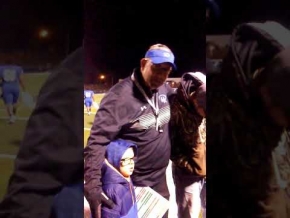Local man has rare brain disorder


On March 9, 2015, Brent Smith, a former Morris County and Titus County Sheriff ’s Deputy, went to his local primary care physician complaining of a consistent headache and left side numbness that included his face, neck, arm, torso, leg and foot. Brent was soon tested for evidence of a stroke by undergoing an MRI of the brain. Upon receiving the results, Smith’s doctors revealed that he has what is called Chiari Malformation.
According to the National Institute of Neurological Disorders and Stroke, Chiari malformations (CMs) are structural defects in the cerebellum, the part of the brain that controls balance. Normally the cerebellum and parts of the brain stem sit in an indented space at the lower rear of the skull, above the foramen magnum (a funnel-like opening to the spinal canal). When part of the cerebellum is located below the foramen magnum, it is called a Chiari malformation. CMs may develop when the bony space is smaller than normal, causing the cerebellum and brain stem to be pushed downward into the foramen magnum and into the upper spinal canal. The resulting pressure on the cerebellum and brain stem may affect functions controlled by these areas and block the flow of cerebrospinal fluid (CSF)— the clear liquid that surrounds and cushions the brain and spinal cord—to and from the brain. Individuals with CM may complain of neck pain, balance problems, muscle weakness, numbness or other abnormal feelings in the arms or legs, dizziness, vision problems, difficulty swallowing, ringing or buzzing in the ears, hearing loss, vomiting, insomnia, depression, or headache made worse by coughing or straining. Hand coordination and fine motor skills may be affected. Symptoms may change for some individuals, depending on the buildup of CSF and resulting pressure on the tissues and nerves.
Persons with a Type I CM may not have symptoms. Adolescents and adults who have CM but no symptoms initially may, later in life, develop signs of the disorder. Also, according to the National Institute of Neurological Disorders and Stroke, Surgery is the only treatment available to correct functional disturbances or halt the progression of damage to the central nervous system. Most individuals who have surgery see a reduction in their symptoms and/or prolonged periods of relative stability. More than one surgery may be needed to treat the condition.
Smith and his family are members of First Baptist Church in Hughes Springs where he plays guitar with his 18 year old son, Blake Smith, in a Christian Band called Redeemed. Smith says that there are good days and bad days when it comes to the symptoms that come with Chiari Malformation and that he deals with all of the above listed symptoms and more on a daily basis. Smith has already undergone one major surgery in April of 2015 in an effort to halt the progression of the disorder and is set for another major surgery in April of this year.
Members of the First Baptist Church in Hughes Springs are holding a benefit for the Smith family in an effort to raise the needed funds to help with the medical costs. The benefit will be held on February 27, from 11 a.m. to 6 p.m. in the Christian Life Center (CLC) in Hughes Springs. There will be live music, a cake walk, a dessert auction, along with grilled burgers, beans, chips and drinks throughout the event. This will be a donations only event. If you cannot attend the event and would like to give a charitable donation, you may contact: First Baptist Church at (903) 639-3581 or Paulette Skinner at (903) 932-0874.
- Log in to post comments








